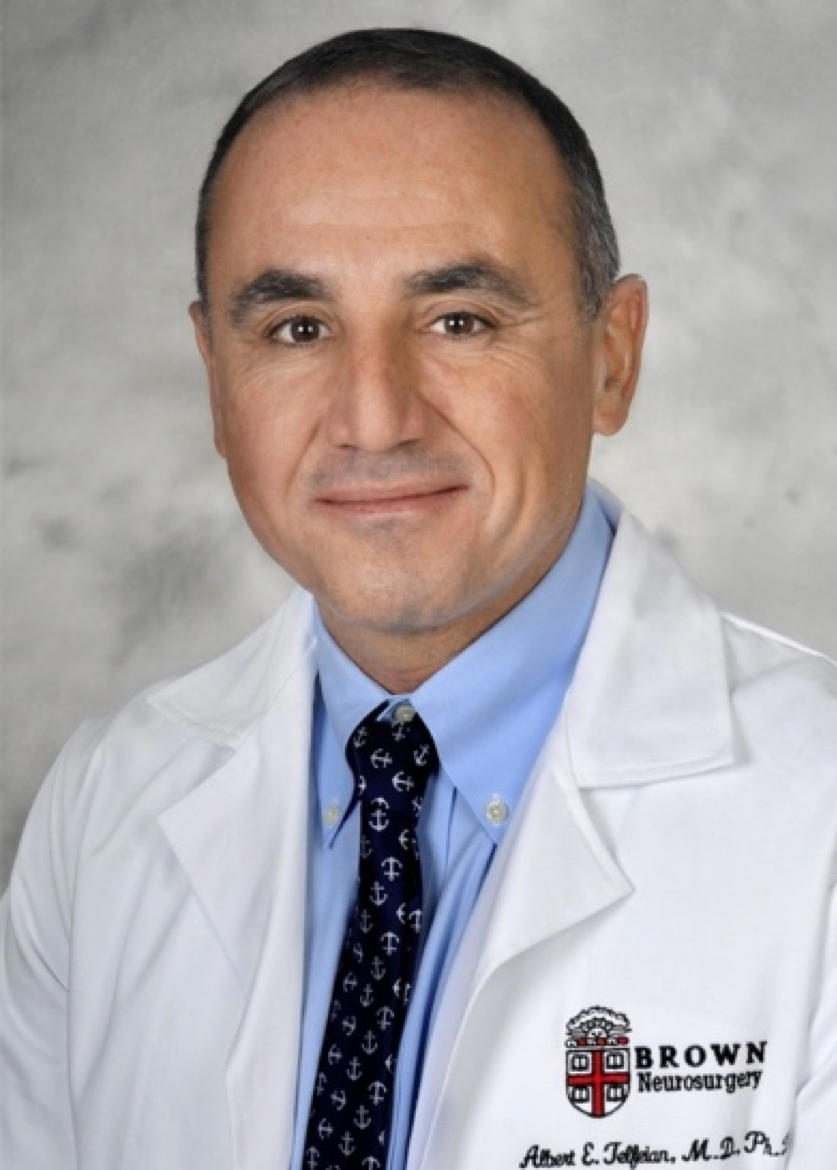Prof. Albert E. Telfeian1, Jin Ye Yeo2
1Department of Neurosurgery, Rhode Island Hospital, The Warren Alpert Medical School of Brown University, Providence, RI, USA; 2JSS Editorial Office, AME Publishing Company
Correspondence to: Jin Ye Yeo. JSS Editorial Office, AME Publishing Company. Email: jss@amegroups.com
This interview can be cited as: Telfeian AE, Yeo JY. Meeting the Editorial Board Member of JSS: Prof. Albert E. Telfeian. J Spine Surg. 2024. https://jss.amegroups.org/post/view/meeting-the-editorial-board-member-of-jss-prof-albert-e-telfeian.
Expert introduction
Prof. Albert E. Telfeian (Figure 1) is a Professor at the Warren Alpert School of Medicine at Brown University where he is the Director of the Center for Minimally Invasive Endoscopic Spine Surgery and the Vice Chair for Quality Improvement in the Department of Neurosurgery.
He is a graduate of the MD/PhD program at The Warren Alpert Medical School of Brown University and completed a postdoctoral fellowship at Yale University and his neurosurgical residency at the Hospital of the University of Pennsylvania. He also completed fellowship training in spine and functional epilepsy surgery at Switzerland’s Centre Hospitalier Universitaire Vaudois and a pediatric neurosurgery fellowship at Children’s Hospital of Philadelphia.
Prof. Telfeian has published extensively in the areas of epilepsy, functional and spine surgery and is currently involved in the research and development of ultra-minimally invasive endoscopic techniques and minimally invasive solutions to complex spine surgical.

Figure 1 Prof. Albert E. Telfeian
Interview
JSS: What drove you into the field of minimally invasive spine surgery?
Prof. Telfeian: My father was an amazing surgeon. When I was 10 years old, he told me that he did not think I was tough enough to be a surgeon. Obviously, I never forgot that. But he had a point and it was my compassion and empathy for patients that drove me to push the boundaries of minimally invasive spine surgery. I hate to see people suffer.
JSS: Could you provide an overview of the current publications in ultra-minimally invasive endoscopic spine surgery techniques?
Prof. Telfeian: The “big new thing” is bi-portal endoscopic surgery. That is really going to bring endoscopic spine surgery to the world. So, all the publications on bi-portal decompression and fusion are exciting. Bi-portal endoscopic spine surgery allows the surgeon to use a shoulder arthroscope and a standard minimally invasive spine surgery drill to do endoscopic decompressions. The startup costs are lower for the facility and the technique is very powerful and accessible to surgeons already familiar with minimally invasive techniques.
JSS: How do you see the role of emerging technologies, such as advanced imaging and artificial intelligence (AI), shaping the future of ultra-minimally invasive spine surgery?
Prof. Telfeian: I do not see the big leaps coming from AI or advanced imaging. I think the big leaps will come from novel pain therapies and how they will be applied by minimally invasive spine surgeons. I personally patented a “paddle” dorsal column stimulator that is inserted into the spine through a needle, and then once deployed, takes on a similar conformation to a paddle electrode. A ‘paddle” electrode is an electrode array that comes in the shape of a rectangle and covers most of the dorsal surface of the spinal cord. It requires a laminectomy to place it. Being able to get paddle-coverage with a percutaneous device would be a great improvement for patients and surgeons.
JSS: What areas of spine surgery are you most excited about in terms of future research?
Prof. Telfeian: A recent study in sheep showed the possibility of regenerating knee cartilage. That suggests the possibility of biologically regenerating intervertebral discs in the future.
JSS: What are some of the biggest challenges you face when implementing new surgical techniques in a clinical setting? How do you overcome them?
Prof. Telfeian: From day one, I have always been very careful about adopting new spine technologies. My practice is to shop very carefully for what will be best for my patients. I try to be a discerning shopper of new surgical technologies.
JSS: Looking back on your career, what do you hope will be your lasting impact on the field of neurosurgery and spine surgery?
Prof. Telfeian: I train residents and three spine fellows a year. At Brown, we have the best spine fellowship in the world. I will leave my mark, and help the people by training them. But I still know that my last words will be a quote from the movie Schindler’s List “I could have done more”.
JSS: How has your experience been as an Editorial Board Member of JSS?
Prof. Telfeian: I love being able to see the newest, best work in the world that comes to JSS and see it first.
JSS: As an Editorial Board Member, what are your expectations for JSS?
Prof. Telfeian: I hope that JSS can be the premier spine surgery journal in the world.
